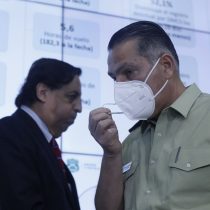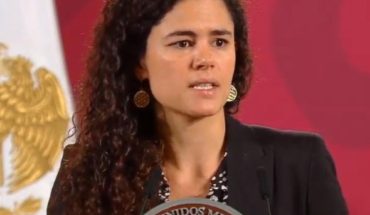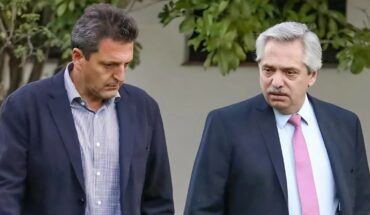
When government spokesman Jaime Bellolio was consulted for the continuity of Carabineros’ managing general Mario Rozas in a TVN interview on Sunday night, he noted that “each of us is always under review”. A phrase interpreted as the clearest sign at this point that the Government would not be willing to immolate itself again alongside the figure of the highest authority of the uniformed police, unlike from the social outburst until now. La Moneda’s determination to back Interior Minister Victor Pérez to crack down left Rozas out in the open, who, while at first useful to the Executive, today became a headache of proportions.
And it is that in a month of his complex by the plebiscite of the 25th and the first anniversary of the social outburst, what happened on Friday afternoon in the framework of a demonstration in Plaza Italia – a 16-year-old teenager on the Mapocho riverbed after being pushed by a member of the Carabineros Special Forces – forced the Government to reorder priorities and milimetrically calculate each signal to try to avoid that scales the tense ambient temperature.
Nothing is casual or free these days in the palace and less in this case. Minister Pérez was asked about an eventual departure from the uniformed institution’s boss and his first answer was that “by pointing our finger at another we will not overcome this difficulty”, a word game with which he avoided talking about endorsements and trusts. In the words of the spokesman Bellolio on Sunday night, yesterday afternoon there was a private meeting between Pérez and General Rozas in La Moneda, just three days after the unfortunate events of the Pio Nono Bridge.
Once the appointment that lasted only half an hour was completed, the managing general quietly with Morandé 80, there was no joint press point, no public statements of any kind, not even an official version of the meeting and minutes later, the President, Sebastián Piñera, crossed from his direct office to the courtyard of Los Canelos, where the interior offices are.
For La Moneda, Rozas’ situation has become delicate and complicated, even more so after it became known that the Public Prosecutor’s Office formalized nine other carabinieri for the crime of cover-up, which would have led to other determinations being shuffled within the Government, such as deciding who should pay the political cost if this episode becomes unsustainable. In parallel with public pressure from the exit of the uniformed police chief, what happened reactivated the constitutional charge against the interior minister in parallel lane.
Faced with this fact, in yesterday morning’s political committee in La Moneda he decided to support “a rajatabla” the management of Pérez in Interior, through the deployment of leaders and parliamentarians of Chile Vamos to politically shield his figure, to whom the opposition has several accounts receivable in just over two months in the Government. Moreover, the meeting between political ministers with President Piñera also spoke of the situation in Rozas, but according to some of those present it was only generally, although one person of government showed that if in a disjunction like this it is decided to explicitly support one and not the other, it is “there are not many possible readings”.
From Chile Vamos have given no room for the questions of their Minister of the Interior, realizing the unity with which this case is being worked and on a par with the Government. And while several question the opposition’s ability to bring the charge against Perez to fruition in Congress, some alarms were still set out when yesterday Mr. RN, Miguel Mellado, publicly questioned the management of the minister and said that he was willing to vote for the libel, if it included a chapter on the Region of La Araucanía.
The worst time
While the Government has not indeed immolated to shield General Rozas, in La Moneda they are very concerned about the moment this new crisis breaks out. They acknowledged that the ghost of the threat of a strike of fallen arms from Carabineros, which according to palace sources was hours away from the end of last year at the worst moments of the social outburst, is still present. The possibility that this situation will be repeated or that in fact is concretyou, that’s what has the palace tenants upside down trying to find a way out that doesn’t end up transforming into a buffalo.
For some, carabinieri’s headlessness as a political signal would have the immediate effect of lowering public pressure on the street and constitutional indictment, but that option, they added, remains subject to the unresolved dilemma that there is no one to replace General Rozas at the moment. In the palace they recalled that the dismissal of more than 30 generals, once assumed by this Government and coupled with the call to withdraw the former General Director, Hermes Soto, in the framework of the Catrillanca case, caused many of the uniforms who were not yet prepared to agree to a promotion in the “unavozable” command, which would in part be one of the reasons for the bad state in which the institution is located.
The situation of Rozas is not easy, since the responsibility of the command that falls within the case of the Pio Nono Bridge, also weighs on it the numerous reports of international entities such as the UN or Amnesty International, which denounced the violation of human rights by carabinieri during the social outburst, in addition to the nearly three hundred citizens who ended up with eye damage and hundreds of complaints for different types of Crime.
The executive director of the Institute of Studies of the Society, Claudio Alvarado, noted that “obviously the questions to Carabineros and the Government in this matter put him in a very delicate situation, but it seems that his future depends first and foremosm on himself. Since Pérez took office, he has been empowered, as is often said today, beyond the criticism he has received. Its main challenge is to show that today this empowerment translates into effective civil control over the police and that the indispensable concern for public order means taking the carabinieri crisis very seriously. If the signals and measures are adequate, he could even get away with all this, the point is that that means understanding that there is a very deep problem at stake, which requires measures and signals at the height of the circumstances.”
The political analyst, Mauricio Morales, added that “in this context of conflict between citizens, carabinieri and the government either Rozas is sacrificed or the Minister of the Interior is sacrificed, but the two together cannot continue in their respective positions, for the simple reason that the presence of both as a whole, the only thing that will generate will be a greater climate of polarization. In the country, it will also generate a much more critical stance on the part of the opposition, the presence of both can give rise to or stimulate greater citizen mobilization and an increase in the degree of social protest.”
Victor Perez’s flanks
Just over two months after being endowed as minister of the interior, the former Senator UDI has had a sweet and graceful step – depending on whoever is asked – in his landing in La Moneda. For his closest collaborators, there is no doubt that unlike his predecessor Gonzalo Blumel, he did manage to do the work of president Piñera’s shield, being able to bring the most political conflicts to his office and thus taking the Representative off the flank, who prior to the last ministerial adjustment was in the midst of a permanent trial of his leadership among his own.
But there are others, several from Chile Vamos, who criticized that with only two months of management, Pérez has too many flanks open and that in a polarized and electoral environment like the one that is lived, could attack his figure before those believed.
Armored by the UDI, which finally managed to regain the power of the ministry of the Interior, in the palace they claimed that pulling Victor Perez out will be so or more complicated than having taken out the former minister, Andrés Chadwick. While it does not respond to the patterns of the President’s cousin, such as his closeness and degrees of trust, the fact that he had his party as contention, they indicated, is a guarantee of permanence, if anything out of the ordinary happened.
And that’s the point. While part of his mandate is to work to recover the right-wing electorate that the government lost during the social outburst, many have questioned the interior minister for his lack of sensitivity in a position spoken on behalf of the government and the President “as far as one represents oneself” in the Senate.
In this sense and attributable to his personality, but also to his political configuration, is the lack of empathy he has shown with the latest events, where while his management and independence stand out, his character as a tough and gremialist man would be playing against him. Instead of controlling the situation, they accused, Minister Perez has ended up installing the problems at intpalace erior, a manual error for any portfolio boss, as happened with the stop of truckers.
One of the last sentences that welts in several of the officialism, was the answer he delivered over the weekend when he was consulted because, when in previous demonstrations a Carabineros motorcycle was thrown into the bed of the Mapocho River, there was immediately a complaint, a situation that contrasts with the action at the time of the 16-year-old’s situation. Pérez’s response was that “complaints, often people say, complain, complaints are presented and that is not the way”, adding that what he believes is that these must be made “with much greater background and clearly concrete each one of them in an effective way to make a truly contribution”, a very unsatisfactory response in the voice of several of his own sector.
Yesterday afternoon the minister participated in the Senate Human Rights Commission and then agreed with Mario Rozas on the Citizen Security Commission of the Chamber of Deputies. In that last instance, Pérez said of the pio Nono Bridge case that “we want to be very cautious, because there have been different versions of what happened”, a very dissimile speech to which he presented when he was asked some time ago about the judicial situation of his friend Pablo Longueira, from whom he noted that “I am sure he is absolutely innocent”.
For Morales, the difference between Chadwick and the current interior minister, “is that Chadwick represented President Piñera’s narrowest circle, instead Victor Perez represents a very important sector on the right, an issue that has already been evident at three points. When Pérez in his first address, without question in between, pointed out that one of his objectives was to replenish the rule of law in the Araucanía. Secondly, the treatment that Víctor Pérez promoted from the Government to solve the stoppage of truckers, which is a guild that has its history in Chile. Third, lack of empathy that the Government has shown with what happened recently.”





